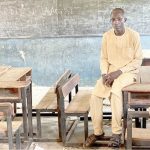It is no news, the level of insecurity in Northern Nigeria. However, what is news, is the attempt by millennials, from the region whose presence in the social media space sought to give the security situation in the region a new approach, breath and global attention.
These groups of young, obviously frustrated, savvy and perceptive individuals, using different social spaces like TikTok, Twitter and Facebook, are seeking to change the narrative on the recurring insecurity facing the region.
Buoyed and inspired by the solidarity, coming on the heels of the death of singer, Ilerioluwa Oladimeji Aloba, known as Mohbad, by southern youths, politicians, traditional and community leaders, who protested for days, until they got the attention of the whole country. Even the National Assembly observed a minute’s silence on his (Mohbad) behalf. It didn’t end there. All suspects in the matter were rounded up and placed in custody, while the police swiftly carried out an intricate investigation into the death of the late singer.
Curiously, the deafening silence in the north of the country was both appalling and shocking. In the same period when the southern youths were holding processions, violent protests across Lagos and other states against the death, (not killing ooo) of the late singer, five students, mostly girls were abducted by terrorists (not bandits), at Federal University Gusau, in Zamfara State. Now, contrast this with the Mohbad episode.
- Senate withdraws motion calling for reopening of Nigeria-Niger borders
- Kaduna offers scholarships to 50 students to study ICT at Indian varsity
This dual scenario aptly captured the tale of two societies. It depicts fundamental flaws — socially and culturally. One seems to exit and break away from the shackles of suppression, oppression and economic degradation, while the other still holds tightly to an opaque and subservient belief on the fabled principle of non-protest or revolt, against injustice, high-handedness, executive thievery and existential threat, even in the face of annihilation.
The EndSARs protests a few years ago, which was a protest against police excesses, allegedly on a symbolic class of youths – Yahoo boys – saw the immediate disbanding of the anti-crime police unit
According to the Global Terrorism Index (GTI), Nigeria ranked eighth in the global terrorism index, with kidnap for ransom posing a more lethal challenge. The Centre for Democracy and Development (CDD) reports over 60,000 deaths across 18 states in northern Nigeria, with the North West alone, accounting for the highest, in the last few years in the wake of an increased level of insecurity.
Had these killings, or a fraction of it occurred in southern Nigeria, the backlash and condemnation would have been massive. The reaction, would without doubt be ferocious. Hashtags, violent protests demanding an end to such killings would be fiercely amplified by youths, politicians, traditional institutions and the press.
Juxtapose these scenarios between both regions. The region’s worst hit is inadvertently sombre and laid back. Relishing and living in self-denial with an abstract and dogmatic worldview where protest is both morally and culturally wrong. The counterintuitive syndrome on the psyche of northerners had dragged the region retrogressively.
The leadership of the region, if there is any left, obviously lacks focus. I can state for a fact, that since the demise of Sardauna, followed by his close lieutenants, the region has no single central authority to inspire and genuinely lead the once boisterous, prosperous and peaceful region. Forget the numerous sociocultural organizations across the region.
Irked by the incessant and senseless killings, kidnap for ransom in the north of the country, whenever any group mostly youths seeks to stage a protest— a peaceful assemblage of placard-carrying individuals, security agencies either disrupt or refuse them permission. Amidst such, the so-called leadership of the region lost its voice.
Apparently angered by the spate of killings, and the manifest silence of leaders of thought, a courageous young lady, Zainab Nasir Ahmad, convened the #NoMoreBloodShed protest in December 2021. Your guess is as good as a crystal ball. The Department of State Service, the country’s secret police, invited and intimidated her into backing off. The protest never saw the light of the day. The press, especially in the North is complicit.
In his famous quote, the late American Rock singer, Jim Morrison said, “Whoever controls the media, controls the mind”. Obviously, such mind game and media control has elevated the South on how best to make the most out of such platforms, to be heard.
The new wave of insecurity in the region, especially the North West, is frightening, given that the terrorists go for softer targets—female students. Not less than 20 students were kidnapped within a spate of one week between Sokoto, Katsina and Zamfara. Yet, no peaceful protests, solidarity walk or outrage emanating from the region.
The closest event in solidarity with the abducted students came in the form of uninspiring hashtags which lasted just a few days. The media hype and attention of the #Bringback our sisters and #Secure North, was manifestly poor. Northern celebrities who took part didn’t go beyond raising the placard-themed hashtags.
Northern youths, who form a large chunk of the population, must learn to take back the region; by extension their future. Looking up to an imaginary elder from within is akin to growing a rose from concrete. The “northern elders” had besieged Abuja, in search of “appointments”.
If as demographics, the northern youths can unite against the ills and seek justice through sheer resilience to end insecurity and several other existential threats in the region, that would be the single greatest achievement recorded in the modern history of the region.
It is very plausible to do so. Like Senator Shehu Sani said, “Until we get more and more youths from northern Nigeria on Twitter, WhatsApp, TikTok, Instagram and other digital spaces, the southern youths would continue to speak on our behalf, and control the narrative on both national and international discourse”.
It won’t be sufficient to get as many people from the North on these media platforms, but the challenge would inadvertently be the contents. The concerns of most Arewa youths are their penchant for trivializing issues by reducing important topical discourse to petty gossip, social media banter and political attack dogs.
Until an informed conversation is built around the region’s unique and multifaceted challenges like, out-of-school children, terrorism veiled in banditry, kidnap for ransom, ethno-religious strife etc, we would be in a pointless rigmarole.
There must be a conscious and sustained effort towards changing this devious and evil enterprise. The closest path to achieving this lies with the youths. Nobody would anchor any significant change from outside. It has to be from within, and it begins with all of us, to ask the inevitable question—how long, can we continue like this?
Mohammed is with the Ahmadu Bello University, Zaria. [email protected]

 Join Daily Trust WhatsApp Community For Quick Access To News and Happenings Around You.
Join Daily Trust WhatsApp Community For Quick Access To News and Happenings Around You.


